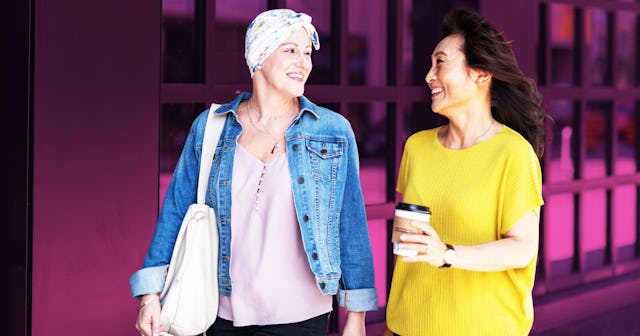How To Make Mom Friends When You Have Metastatic Cancer

Last week, I was sitting on a park bench while my son, almost four years old, ran around the playground with some other kids that I didn’t know. As young kids are, they were not strangers for long, yelling and laughing as they played castle, sold ice cream at an imaginary store, and hunted for buried treasure. While the children played, one of the moms struck up a conversation with me: our sons seemed about the same age, and she wanted to exchange contact information for a playdate. At this point, this is the dream outcome of a park visit: finding a kid that your kid wants to play with (and plays well with) and a parent who wants to hang out again. Jackpot.
We had moved to the neighborhood almost two years prior, but we were still establishing our network of friends in our new town. To make things more difficult and awkward, I was diagnosed with metastatic breast cancer two months after our move. In a few moments, our lives shifted irreversibly from a new family exploring the town to lives needing emergency childcare, endless medical appointments, procedures, uncertainty, and tears. Many of our friends from our former neighborhood were no longer upstairs or down the street, available to help at a moment’s notice, but would occasionally text some trite pleasantries, if anything at all. It was an ugly, scary time for us, and as I became sicker and my son got older, the scars our family had earned as we continued onward became harder to mask.
When a friend is very sick, it can be tremendously difficult to gauge the level of support they want or need. The overused phrase “let me know what I can do” creates a burden on the sick friend. Many people want to help, to support, to hold space, but accepting help is not an easy or intuitive thing to do, and often, unfortunately, our response is “I’m ok!” when we are anything but. We simply cannot carry the mental load of further management of someone’s help, no matter how well-intentioned.
Back at the park, I exchanged pleasantries with the mom, who seemed comfortable chatting with me, and not put off by my bald head. We transversed all of the subjects that friendly strangers broach when their children are playing nicely together. It’s a cautious dance — simultaneously showing vulnerability and holding back information that might alienate or put off. We talked about houses but avoided any overt insinuations about money, about schooling without disparaging the teachers or the district, about parenting without showing one’s hand regarding parenting philosophies.
We then shifted into the realm of siblings. “Do you have any other kids?” She asked. “No,” I responded. “We are one and done.” At this point, it was difficult to dance around my cancer diagnosis. The timing of such a revelation in casual conversation has shifted over the course of my diagnosis. Early on, I was quick to reveal my illness, desperate for friendship and support as a mother of a young child, still wrapping my head around the tangible pieces of my new life. Now, nearly two years into life with metastatic disease, my body serves as a revelatory vessel without the use of words. My head is newly shaved from my most recent course of chemotherapy, and I have a very arthritic hip and lower back due to metastases to my bones, giving me a small limp.
As my illness has progressed, I am more vulnerable, less interested to dive into a lengthy conversation about life with cancer — how did I find it, what does my son know, where am I being treated, am I on chemo, will I ever be done with treatment, does it hurt, what’s my prognosis, have I tried any number of off-label treatments not appropriate for my disease. I am weary of the journey, much more so than in my early months.
The conversation then inevitably changes course. The other mom will often lower her voice, shift her gaze to one of pity and sadness, not fully comprehending the painful divergence that my illness has forced upon my family. They offer up some platitudes, searching for a thread of positivity — “Hopefully you’re doing well!” or “Hopefully they caught it early!” Unfortunately, neither thing is true, and once I have crossed this bridge, I am unwilling to hold someone’s hand as they look uneasily over the edge. So I tell the truth — my disease is metastatic, end stage, and has progressed significantly over the last few months. This is the point of no return, when our conversation, and any possible friendship, can be formed or discarded. Often, unfortunately, it is usually the latter.
But occasionally, the fortitude of my new friend will surprise me. As our kids run circles around us, she will meet my gaze with eyes not full of pity, but of solidarity. That gaze links arms with me and with my family. Instead of grasping for the railings of that tenuous bridge by myself, I am held up by the willingness, openness, and strength of the person who was, moments before, a stranger.
This article was originally published on